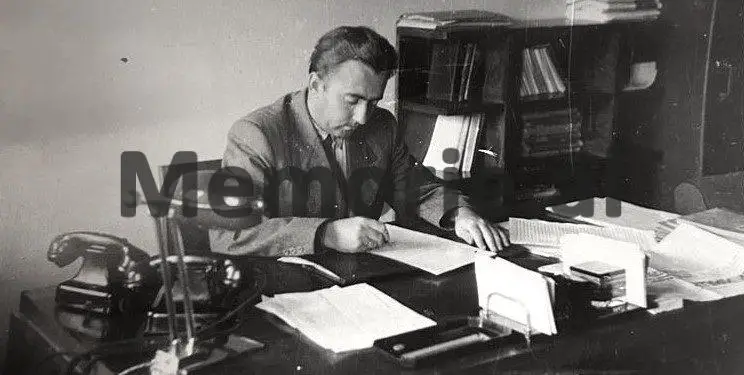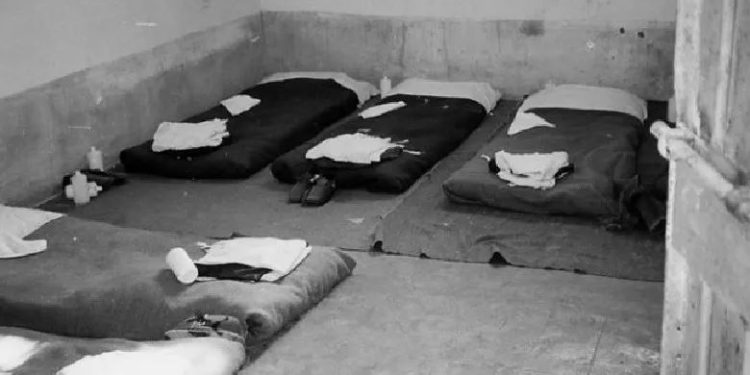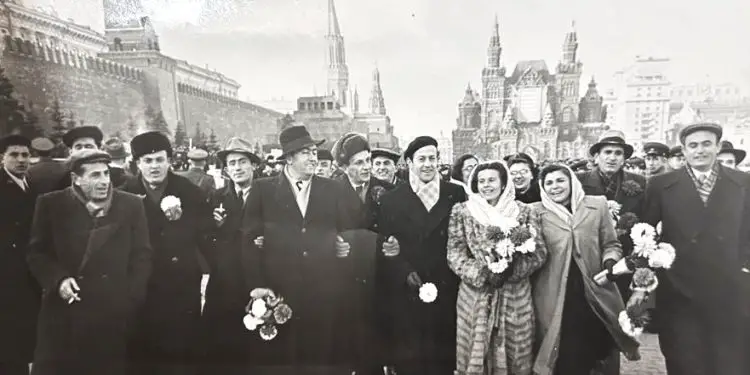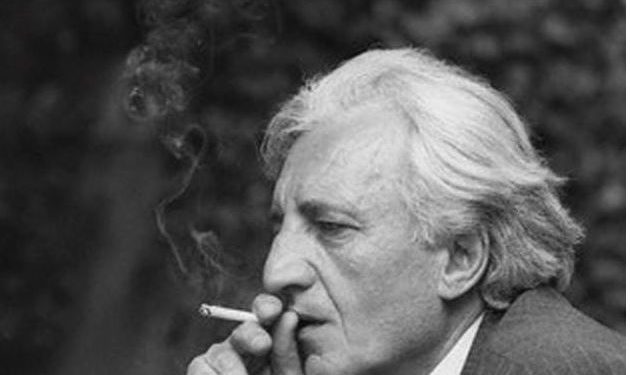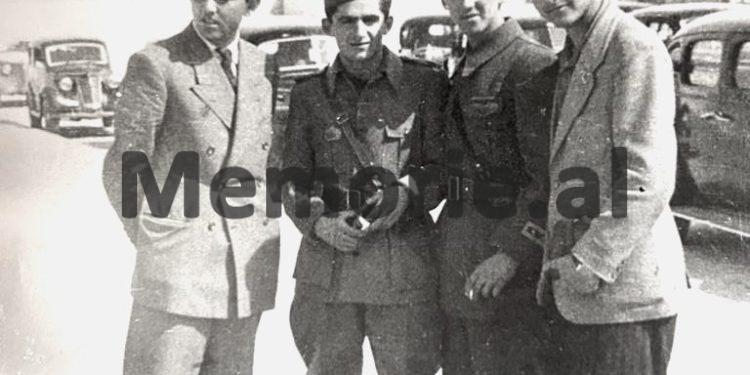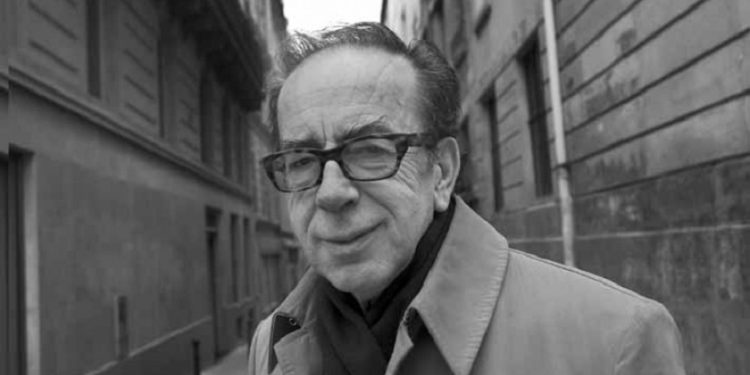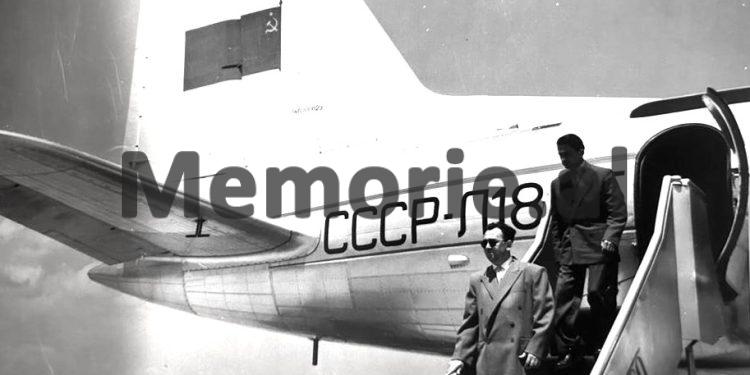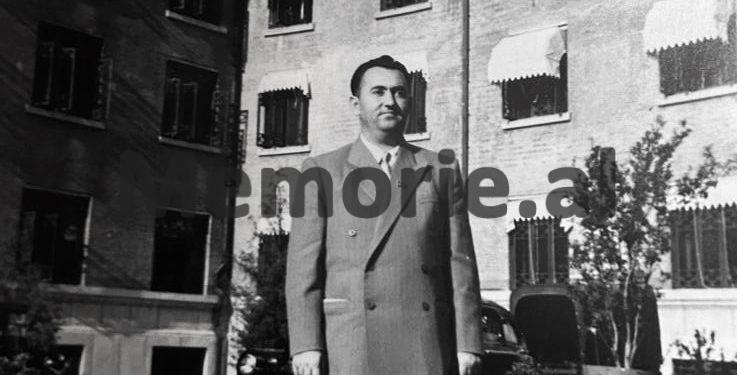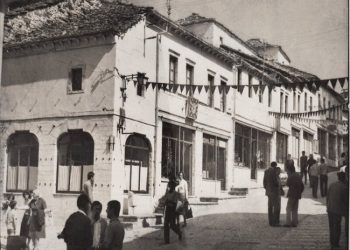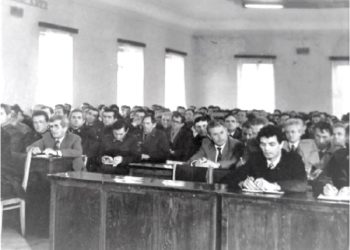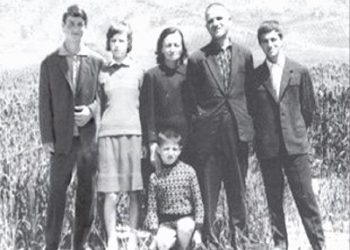By Fadil Paçrami
Part eleven
Memorie.al / What is prison? It is the place where those who have been sentenced to deprivation of liberty are kept, we would say by reading any dictionary. But that is little. Prison and freedom – two opposites. Previously: what is freedom? In short: to be free means to do what you want, to think and act as you wish in the exercise and fulfillment of your freedoms and rights, as a person and as a citizen, but always without harming and violating others. . Again: to think and act. We are talking about democratic freedoms, from those of speech, press, assembly and organization in various parties and associations, ensuring the conditions where ideas, requests and human wills can find expression and concretization, from those of the biological-related plan with the being itself, to those of the social plan, related to the ways of living.
Continues from last issue
This decision is not supported by law and evidence. The defendant, Fadil Paçrami, was unjustly declared guilty of the crimes of sabotage and propaganda agitation, provided by article 72 and 73 of the Criminal Code (of 1952), since the court’s decision is not even based on the requirements of these provisions, for the existence of the figure of the crime of sabotage, agitation and propaganda, not even in evidence. In its decision, the court admits that the defendant Fadil has sabotaged the line of the Labor Party, since being the secretary of the committee of this party, for the district of Tirana, not only did he not lead in the basic organizations of artistic and cultural institutions that had subordinated, the decisions and directives of the party, but many of them, he has distorted with hostile intent, planting liberalism in these sectors.
Specifically, as such activity, the views of the judge Fadil have been called, regarding the treatment of generations of art and culture workers, to set them against each other, leaving them without working in these organizations, and some party materials and some view of the judge, for theater, painting and literature and art in general…! In addition to the important deficiencies in terms of the evidence of the above decision of the Supreme Court, for the two criminal offenses for which the judge Fadil Paçrami was declared guilty, contrary to the law, the provision of Article 72 of the Criminal Code, a interpretation that goes beyond the goals of its content.
Thus, at a time when from the content of this provision, it is clear that the actions or inactions, which constituted the figure of the crime of sabotage, were aimed at concrete relations in the field of economy and state activity, carried out with the aim of weakening popular power, from the of the court, different views of the defendant were interpreted and accepted as such, which were not in accordance with the political line of the Labor Party, or which damaged its activity, as a party activity and not a state activity, as requested in express way of the law, by which the activity of this defendant is defined. By doing so, the court has unjustly declared the judge Fadil, guilty, for actions or omissions that, even if it had been proven that they were committed at the time of their commission, were not foreseen by any provision of the special part of the Criminal Code in force, as a criminal offense.
The court, as evidence for the crime of agitation and propaganda, for which the defendant Fadil pleaded guilty, accepted the records of the questioning of several other defendants… without requesting that they be given the procedural form requested by the law and without subjecting, where it was possible, to the process of verifying their authenticity those actions, the performance of which becomes necessary, due to the categorical denial attitude that the investigator and the defendant held in the trial, to the explanations that had given these persons, under his charge. In accordance with the requirements of the law, only the attributions of the defendant Dashnor Mamaqi were administered, but in the conditions where they remained the only evidence, in terms of the charge of agitation and propaganda against the defendant Fadil, the court should not reach the conclusion, that this offense was committed by the defendant.
Therefore, facing such facts, the Supreme Court plenum, as I was informed at that time, decided: “By decision No. 65, dated 23.8.1991, of the Supreme Court plenum, it was decided to cancel the decision No. 2, dated 31.3.1977, of the Supreme Court and dismissal of the case for the judge Fadil Paçrami”
And as foreseen in the law, the announcement of this decision was made by the president of the Supreme Court himself, after a few days, in a large public meeting with writers, artists and cultural workers, as well as through the press.
- A special chapter consists of the letters sent at that time from the prison to Ramis Ali, in order not to do the defendant and not to adhere to it, “continuity”, for which he had sworn publicly, but to correct whatever possible and as early as possible, as well as not to hinder the country’s democratization processes. From the prison, we observed the crisis that had involved the totalitarian regime of the Soviet model in us, as in all other countries of the East, and everything that was happening, we felt the shocks, the cracks and the approach of the overthrow of the dictatorship, we followed the maneuvers to extend them life and impeded democratic developments, we were also concerned about the risks that the reluctance, indecisions and tricks, typical of alla Ramizche, carried, which could have catastrophic consequences for the fate of the country.
On occasion, sometimes openly and directly, sometimes in the form of suggestive questions, touching on issues from the past and those laid out for solution, without sparing remarks and opinions, he was called upon to correctly evaluate situations and act in time. This was more than a challenge. It was time to denounce all the bad things that were done, the vices and the lawlessness, to reject the mindset, concepts, methods and practices that had served the dictatorship and open the way for the speeding up of democratic developments with courage and wisdom. The concern is this: what is being done, why is it not moving faster, what will the future be?
… AND APPEAL
Those who fought in one way or another against totalitarianism, to pave the way for democratizing processes, were punished and persecuted as many citizens, for nearly half a century, or were in prisons; many of the honest people and advanced intellectuals rightly thought and worried, they had not been, and even less were now, purely personal matters – for me, you and that other person, as persons, but concerns for the country and his future . The letters addressed to those who at that time were in charge of the party – state, as well as those addressed to the new anti-dictatorial and democratic forces, – to the leaders of the newly created main political parties and to those for freedoms and human rights, before the pluralistic elections, speak of this. of March 31, 1991, in which some opinions are expressed to realize and take further the turn that has just started.
This was an appeal to cut the bridges with the monist past, to enter with courage and determination on the path of democratization, to fix and put in place what had been done wrong, to avoid obstacles of any kind and from anyone, to avoid and overcome the dasis and revanchisms as remnants from the past and the accumulated scum, to look at things realistically, so that we can also gain the lost time.
The time itself, the developments that were taking place abroad and inside the country, the inspiring ideas for freedom, rights and democracy with the proportions that they had reached at the end of this century, the accelerated changes in the process and that were required everywhere, encouraged in us also various thoughts about alternatives. , which had to be assessed, measured, confronted and given solutions. Time and subsequent developments would bring other, even deeper ones.
Always having as a basis and goal the progress and the good of the country, the well-known principles of democracy and the sacred national issue, it was necessary to find a common language, to stop the further decline, to bring the country out of the precipice into a better field. wide, as well as to walk with faster steps on the path started – this was the appeal of the time, that’s what I tried to do as much as I could even in the conditions, I found myself in.
Without pretending to anything; while also respecting the opinions of others, I intended to give some opinion, however modest, as it was happening at the time, with everyone concerned about the fate of the country. This country had never seen a revitalization of thought, aspirations and the search for the most effective forms and means, for progress in all fields, all the breadth and dimensions of the developments of the time, for the fall of the dictatorship and the victory of democracy.
AS A LITERARY TESTAMENT
(Two cards)
I called them like this: “As a literary testament”, based on the purpose and the message they carried in the conditions and at the time when they were sent: the first on 6.9.1988 and the second on 11.10.1990. I singled them out from the others, as well as the other four, which accompany them below, since they deal with issues of creativity.
First
Received: Dritëro Agolli, Dhimitër Shuteriqi, Ismail Kadare
I address you as; three “personalities… well-known in the field of letters, arts, science…”, as it was written for you in a headline article of “Voice of the People”, dated 2.4.1988.
I am making it clear from the beginning: I will not tell you anything about my ongoing tragedy. (With that – these two words, close this chapter).
– That I don’t want to confuse you, with anything and for nothing;
– Because I am not of the type of carers, I don’t even have a reason, a reason;
– That people of art – those with stable convictions, can demand, protest, revolt, etc., but not complain or lick.
Then why, what drives me? I come to knock on your door, for something I think belongs to you. I mean here: literary and artistic creativity – the works, after they are “poured” on paper (on canvas, pentagram, bronze, cellulose, etc.) from the manuscript all the way they follow to (the reader, the viewer and the listener), they do not they belong only to the author (I emphasize: not only to him), but they are something more – they are values of the cultural fund of the country, which every citizen, the state itself, has the duty to take care of, preserve and protect , even more so those who love art, appreciate it, rejoice, hurt… and what else can I say, in a word – they know its values.
Here in the prison (notorious as it is rightly called) of Burrell, I have written 37 plays so far. It falls, so 3-4 a year. So, together with those 13 others, written before, when I was free, there are 50 in total. (That’s why I started to send them this letter). Numbers, you know, don’t say anything, but at least they say that I didn’t sit idly by even in these conditions. I really saw “hajri” badly, he – the theater, but I wasn’t angry with him (it’s not his fault!).
Then I was not in control of myself, – such passions are stronger than people’s wills. At once this speaks; even though with everything I have, I did not serve the anger and resentment, but I went to meet the society, the construction of the country, no matter how much they had denied me, on the path I had started, without leaving my ideals and myself. Otherwise, it could not happen, nor is it explained.
(Every evil has its good. I don’t know of any other place, meditation and concentration, like a prison. All day and part of the night, stay with yourself, thoughts and worries, that urge and torment you – of course manage to break away and rise above the gloomy, heavy and dirty environment of the prison. Or time to work, as much as you want.
By this I do not mean that the creators should go through these cells, behind thick walls and bars, from where you see the sky “shattered into four or ten pieces” – as our great Migjen says. Not even to say one day, that; “The prison had a good one, because he wrote a lot, maybe even well, what he wouldn’t achieve if he was free!” Something about the meaning of these words can be extracted, of course, while maintaining the dimensions, from the great of our culture, Fan Noli, in the book; “The Albanian lives or lives and does not die”, there from the middle of page 230, replacing the words; “without bread”, with; “no freedom”. Nesse, I’m sorry… I wanted to say that it wasn’t simple or easy at all, but I made it to the top and that’s the main thing).
I had to find the key (nowadays to be more precise, it’s the button) to start the engines – creative thought, imagination, inspiration, craftsmanship, courage, whatever it took. And I found it: in abstraction – coming out of “my hole” with mind and heart, (yes Migjeni – “The Prisoner’s Song”), to rise above the spiritual and physical suffering, the suffocating monotony, everything dark and gray, that there is where I am and to become one with the people, where they live and work, outside these walls and bars.
In short: I decided to remain human, to remain with art, to remain who I was. And I succeeded. Where did I get the prompts, the ideas, the themes, the events, the characters, you mean right? I will answer briefly:
– In those that I brought out from the depths of myself, where there were, maybe even dozing, all the sprouts that I had experienced and gathered, during a time of many years, intensively guarded between the waves of the biggest, that passed the country and I saw young, I chewed them, processed them and gave them the form they have taken, of dramas.
– In what I read about life and its developments, with the phenomena and contradictions of time, the laws with ups and downs, zigzags, etc., following them step by step, not from afar, but merging with them, and not only from above, as before, but also from below.
– In that ardent and unquenchable aspiration for the future, the good and the beautiful that has, and can have, to feel and love, in a special way, the one to whom they are denied and forbidden.
– In the way you think about it, treat it and solve it (and I think I solved it correctly), that kind of conflict that, of course, cannot but arise in conditions like these that happened to me, when society yesterday, the state, consciously or not, they held the familiar attitude towards me at one time, which is continuing. In readings of all kinds and carefully, as never before, although I did not always have the opportunity to choose as many as I wanted, because such were the conditions.
How much and how I managed all this, let others say. More precisely – works. As Lasgushi says: “The poet creates the work – let the work answer. If it does not speak, the poet has nothing to say.” The old man is very smart! It is not up to me, therefore, to speak about everything I have written.
I am coming to the point – why I am writing to you. I’m sorry if I took a little longer, but I feel the need to talk and discuss these things, that’s why. Loneliness is hard.
I thought I would send you this letter so that, in any case, you know that this creativity exists, and where it is and can be found, (because it is not known how life takes place, and my health is failing me – I am already 67 years old, and among them 13 years of prison in a cell), to send you the titles of the dramas that I have written so far (I have others in my hands, which I can inform you about later) and to tell you that; as long as I am in these conditions that I am in, they will necessarily remain here with me, even though from time to time I work on them, even though they are objects of copyright, as in the form of inviolable manuscripts and protected by the law;
– To know where to look for them and find them at any time, the need arose.
– That it would be a crime in the first place, against the art of the country’s cultural heritage, if anything were to happen to them, to be damaged or violated, no matter how little and by anyone;
– I express my conviction that you will take care of what I ask of you. Sorry for the inconvenience and thank you in advance.
Drama titles and some other clarifications:
- The tragedy of those days
- End without a name
- The overthrow of the gods
- A story from the mine
- When the bells ring
- The tragic fall
- Road match
- Two lives
- Resistance
- The limits of crime
- Big weather and immortality
- After the victory
- Mara (or: A Sleepless Night)
- The foreigner
- Towards the ascent
- The drama of this land
- The awakening of Dr. Zamir
- Human galleries
- The fall of the masks
- The power of truth
- Behind the screams
- Ways of growth
- Enigma
- Where were you?
- Phenomenon and life
- The mold of time
- Turbulent years
- Landscape in motion
- The case remained open
- More than one event
- Frost and flow
- They call her Diana
- End of winter
- Ermir’s concerns
- Light and shadow
- The grotesque fall
- Color of time
Total: 2,258 pages of text, another 85 pages as an introduction at the beginning and 46 pages of notes at the end of each play.
Of these: 2,3,5, are a trilogy, as well as 6,21,23.
Now two words about the 13 plays written before, where they can be found and searched for:
- In the crowd
- On the ruins
- The house on the Boulevard
- White and black
- The slum
- Event at the factory
- Untrodden roads
- 20 days
- I have no longing for old things
- The year ’61
- The case of engineer Saimir
- February 4
- There is no peace in the factory
Of these: 1,2,3,4,5,6,7,8, were published in separate books: “Two dramas”, “Three dramas”, “Even three weddings”, the 9th was published in the magazine ” November, the 10th and 12th, should be found in the archive of the “Popular Theatre”, the 11th in the archive of the “Aleksandër Moisiu” Theater of Durrës, and I don’t know anything about the 13th.
I also have here three multi-page notebooks with notes, for some of the works of Shakespeare, another for the works of Aeschylus, as well as another with; “Thoughts on Creativity, Mainly Theatre”. Maybe they present some interest. This is all I wanted to say, – let this letter serve as a literary testament.
Burrell, 16.9.1988
P.S. – To ease your burden, as well as to avoid any kind of misunderstanding or trouble, I am sending a copy of this letter to the Secretary of the Central Committee for Propaganda, Foto Çami.
– And the last: in any case, the inheritance as copyright remains with the wife and children, to whom I dedicate it. Memorie.al
The next issue follows




